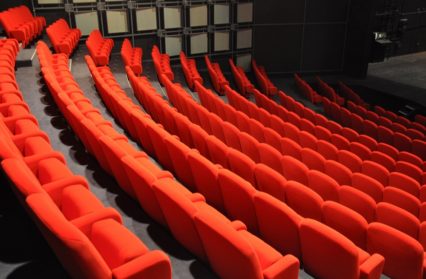Theatres across Wales are finding innovative solutions to help local communities, reports Creu Cymru, the body responsible for the development of theatres and arts venues in Wales.
On Monday 16th March theatres and arts centres around Wales closed to the public due to the pandemic. But while the doors of theatre building’s have closed and the stages are quiet, the unseen work of Wales’ creative hubs has continued to support the need of communities from Port Talbot to Mold.
Many arts organisations have supported the NHS directly. Swansea Grand Theatre, Port Talbot’s Princess Royal Theatre and Theatr Clwyd have all become blood donation centres to support Welsh Blood through this period of high demand and lower supplies. Milford Haven’s Torch Theatre and Ceredigion’s Theatr Felinfach have both made, printed and distributed hundreds of protective face visors for key support workers and carers. The mental health support of vulnerable groups has been a priority for many with projects ranging from Theatr Clwyd’s online Dance for Parkinsons workshops to regular online workshops with high-risk or self-isolating groups.
Liam Evans-Ford, Theatr Clwyd’s Executive Director, said, “We’re hugely proud of the success of the recent blood donation drive with Welsh Blood Service at the theatre. The blood service are a vital part of our NHS and it’s important to us, as a community asset, to play our part and support them.”
Engaging people in the arts digitally has provided a lifeline to many isolated communities. Caerphilly’s Blackwood Miners’ Institute have showcased local artists and bands with online digital performances shared on Facebook. The Sherman Theatre in Cardiff meanwhile produced ten digital including work by the acclaimed playwright Gary Owen and featuring performances by top actors including Lynn Hunter, Michael Sheen and Rakie Ayola. Both Aberdare’s RCT Theatres’ and Flintshire’s Theatr Clwyd have used artistic resources to deliver programmes to marginalised groups including work with refugees and at-risk young people.
Theatr Felinfach in Ceredigion are well known for their excellence in participatory arts. They have supported families dealing with school closures by making creative activities that have been shared widely throughout their community. In Newtown Theatr Hafren’s singing and rhythm classes have been met with overwhelmingly positive feedback and has seen families incorporate classes into home schooling.
The crisis has also led to collaborations that have made a tangible difference to the lives of those most effected by the pandemic. Theatr Clwyd’s collaboration with Flintshire County Council led to a shoebox appeal for “boxes of joy” containing fun, colourful treats to make the world a brighter place for a young person. The appeal, which has been extended saw over 300 boxes donated.
“The appeal has been an amazing success,” said Christy Hoskings, Flintshire County Council’s Planning and Development Officer, “I can’t tell you how humbling it has been, to see the community come together at what is for so many people a really difficult time. People’s generosity has made a real difference to children and young people across the county and we will continue with the appeal, bringing a little light and joy to as many children as we can”.
At Theatr Felinfach in Ceredigion a rainbow painted on the side for the theatre that has grown to symbolised the communities symbol of hope and gratitude to frontline workers and the NHS. Theatres are the heartbeat of their local community. They bring people together to laugh, cry, rejoice and learn. But while they continue to do this during this uncertain time they are increasingly at risk. Many rely on box office income to support the schools, community, and health work that they do in the community.
The creative industries are one of the fastest growing sectors, with an annual turnover of over £1.9 billion. It employs over 58,000 people, 52% more than ten years ago. Whilst a large percentage of this is within the media industry, performing arts is a major part of this and Wales’ global competitiveness in film and tv is threatened as a result of the absence of talent and script development that theatre provides. This is particularly relevant in Wales with the relationship between the Welsh language acting community and S4C. In Wales 75% of people in attend or participate in arts culture or heritage activities three or more times a year. According to the Audience Finder Ticketing Data report 18/19 theatres and arts centres in Wales received £34,875,258 total ticket income. In the same report it noted 3,101,588 attendees to performing arts activity (not including popular music / rock concerts and cinema).
Louise Miles-Payne, Director of Creu Cymru said, “Theatres and arts centres play a vital role in the arts economy in Wales. From small studios to big-budget stages, theatre and the performing arts are part of the fabric of Welsh life. Towns, villages and cities the breadth of Wales have and use theatres for more than seeing a show – they are spaces for many different groups in the community to come together to learn, socialise and create. Theatres are often the heartbeat of the local community. They bring people together to laugh, cry, rejoice and learn. They continue to do this during this uncertain time.”
An old tradition of a single ghost lamp on the stage for safety has become a symbol for theatres during this pandemic – our thriving theatres, a major economic and world-leading industry in the UK, that support communities throughout Wales, are at major risk. Political leaders need to step up and save these vital social, artistic and economic hubs for future generations.












